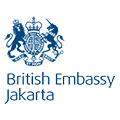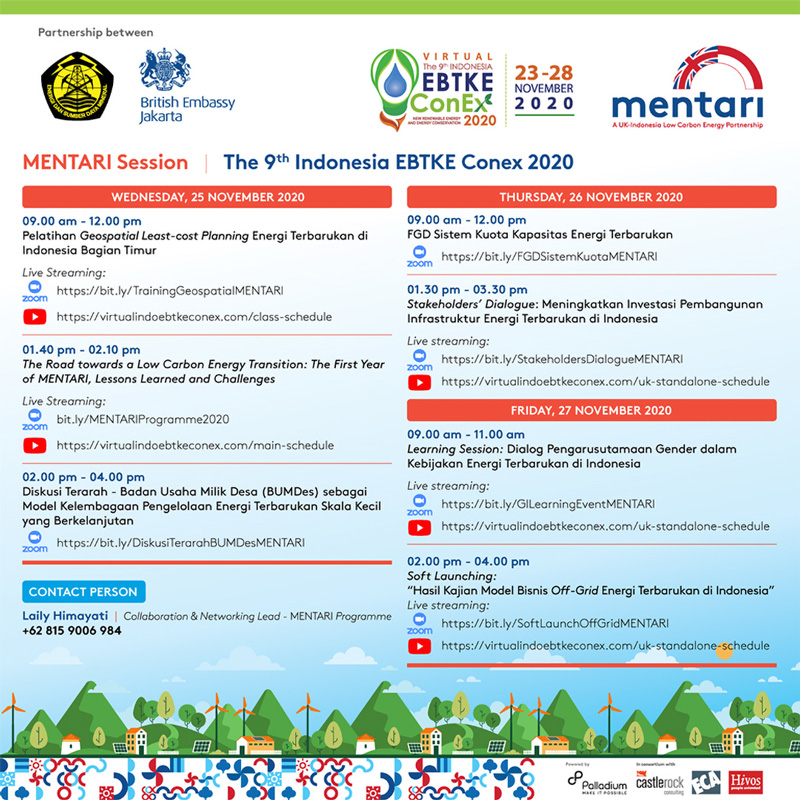The British Government Supports Indonesia To Become A Renewable Energy Producer In The World
Jakarta, 29th November 2020 – United Kingdom government represented by British Ambassador to Indonesia and Timor-Leste H.E. Owen Jenkins said if Indonesia is serious about developing low-carbon energy in all aspects, including the use of renewable energy in particular, he is sure that Indonesia will become a superpower country that can produce the largest renewable energy in the world, considering the rich potential of renewable energy sources in the country.
He also added, if it could be accomplished, Indonesia can increase its economic growth, create more jobs, and help improve the quality of life of its people. The statement is stated when he became a Keynote Speaker in a Plenary Season 1, related to the use of renewable energy in Indonesia, at the 9th Indonesia EBTKE Virtual Conference and Exhibition 2020, occurred on 23-29 November 2020 in Jakarta.
In the event, British Embassy in Jakarta also invited British-based energy and environmental companies to participate in the exhibition, they were Aquatera, Arup, Aggreko, Clarke Energy, Hallidays Hydropower, Ion Venture, Ryse Energy, Loesche Energy Systems, and SMAP Energy. They were expected to show that the business in the renewable energy sector is now doing well globally. The United Kingdom (UK) government currently has a target of reducing emissions by 100 percent in 2050. Furthermore, the production price of renewable energy is also considered quite efficient in the United Kingdom.
Jenkins also explained the UK government concretely supports the Indonesian government in realizing its target to undertake a low carbon development, particularly in terms of providing access to electricity through renewable energy. Both countries collaborated in a program titled MENTARI (stands for Towards a Low Carbon Energy Transition in Indonesia), which officially launched in June 2020.
MENTARI exists as a partnership program between two countries within a period of four years. The program runs under the coordination of the British Embassy in Jakarta with the Ministry of Energy and Mineral Resources (ESDM) as the main partners. The program aimed so that Indonesia can achieve inclusive economic growth, poverty alleviation, increases the electrification ratio, and reduces the impact of climate change in the country.
However, the main goal of MENTARI program is to encourage Indonesia to become a renewable energy superpower with special attention to the development of the low carbon energy sector. During the implementation, MENTARI will provide support for underprivileged communities, especially those who are living in the Eastern Indonesia regions. In general, the program is also expected to create jobs and social inclusion, as well as helping to reduce the impact of climate change and the environment change in Indonesia.
Indonesia EBTKE ConEx 2020 also attended by the representatives of embassies from other developed countries, such as the United States, New Zealand, and Norway. Each of them shared information regarding the scheme of applying renewable energy and energy transition in their respected countries. Through their experiences, it is hoped that they can be applied and adjusted for the development of renewable energy in Indonesia.
For six days, the Indonesia EBTKE Virtual Conference and Exhibition 2020 was attended by more than 7,000 participants from Indonesia and other countries such as from the United States, United Kingdom, Germany, Australia, Sweden, Japan, Singapore, Malaysia and the Philippines. More than 50 companies, local and international Renewable Energy and Energy Conservation Associations participated through the virtual platform. The event has become a forum for exchanging ideas and perspectives from stakeholders in the renewable energy industry and energy conservation to mutually find solutions and innovations in order to accelerate the use of renewable energy and energy conservation in Indonesia.
At the closing of Plenary Session 5 (27/11), Surya Darma as Head of Indonesia Renewable Energy Society (METI) expressed that EBTKE Conex 2020 is seen as support from the communities or non-governmental organizations to promote new and renewable energy both among corporations and societies.
RECOMMENDATIONS FROM THE REDULT OF EBTKE CONEX 2020:
- Encourage the House of Representatives (DPR) and the government to complete the discussion of the Renewable Energy Bill so that there will be a legal umbrella for the application of renewable energy in the long term.
- The government is required to issue Presidential Regulation (Perpres) on renewable energy prices which is currently in the finalization stage. The regulation should regulate so that there is an attractive prices for the investors based on the economics; the fiscal incentives are available if economic prices cannot be achieved, for example granting a tax holiday for at least 10 years without considering the amount of investment; exemption of VAT for the procurement of domestic services and goods; tax allowances and exemption from import duties.
- The Perpres also needs to regulate bankability, so that funding institutions can provide the funds needed for renewable energy investment.
- The government required to finalize the revision of Government Regulation No. 70/2009 on Energy Conservation so that there is a legal basis to meet the energy intensity target
- The government needs to immediately issue a Perpres on the implementation of carbon pricing instruments that will provide a level of playing field between renewable energy and fossil energy
- While preparing the energy plans, in particular a derivative of National General Energy Planning (RUEN) road map, the government is obliged to prioritize the use of Renewable Energy In Regional Energy Plans (RUED), National Electricity General Plan (RUKN), Regional Electricity General Plan (RUKD) and Electricity Procurement Plan (RUPTL). The utilization of other energy sources, such as from nuclear powered electric generator (PLTN) can only be utilized after using renewable energy sources; In the operation of power plants, PLN must prioritize using renewable energy first. It needs to be conducted as a consequence of the government’s efforts in achieving renewable energy targets in the energy mix and reducing greenhouse gas emissions.
- In order to at least to be close to achieve the renewable energy target in the energy mix by 2025, then the provision of renewable energy for an installed capacity of around 10 GW must be carried out no later than Q1 2021 so that the contracted renewable energy generation can start operating in 2023 – 2025. In this case, the government and state-owned electricity company (PLN) must also procure renewable energy on a large scale, especially for Solar Power Plant (PLTS) and Wind Power Plant (PLTB), therefore Indonesia can benefit from the lower price of PLTS and PLTB technology. With the procurement of at least 100 MW per project, it is expected that the PLTS price can reach <4 US cents / kWh.
- The government need to replace fossil-based power plants that are more than 20 years old, for Coal-Fired Power Plant (PLTU) and Gas-Fueled Power Plant (PLTG) or Gas-Fired Power Plant (PLTGU), and more than 15 years for Diesel-Fired Power Plants (PLTD) with renewable energy generation. The government needs to require the use of renewable energy in special economic zones such as tourist areas or industrial areas. The government should form a Renewable Energy Management Agency which will function to implement government policies related to renewable energy, including for implementing renewable energy procurement, so that there is no bias in the procurement if it is performed by PLN.
- The government should form Renewable Energy Fund which will be utilized to finance various matters related to renewable energy, such as payment of fiscal incentives, compensation to PLN, research and development, provision of revolving funds for renewable energy development, and other activities related to renewable energy. The Fund are expected to come from: state budget (APBN) or regional budget (APBD), export levies on renewable and non-renewable energy resources, carbon levies, levies from the communities, grants, and others.
- The government should immediately implement Renewable Energy Portfolio Standard (RPS) which requires fossil power plants to build renewable energy generation with a percentage that is adjusted to the renewable energy target in the energy mix. If it does not meet the requirement, then Renewable Energy Certificate (REC) should be purchased. The government needs to encourage the development of technology that focuses on storage, hydrogen, smart grids, EVs, virtual power plants, digitization, and others. To compensate for the current excess of energy supply, the government must immediately encourage the use of electric vehicles and electric stoves.
- The government need to hold a dialogue with all stakeholders to resolve problems and find solutions related to renewable energy and energy efficiency. This year (2020) Indonesia and United Kingdom governments established a four-year partnership program to support the use of low-carbon energy, which titled MENTARI – Towards a Low Carbon Energy Transition in Indonesia. The program is under coordination of British Embassy in Jakarta together with Indonesia Ministry of Energy and Mineral Resources (MEMR) as the main partner, aims to achieve inclusive economic growth, reduce poverty, increase the electrification ratio, and reduce the impact of climate change in Indonesia.
The main objective of MENTARI is to support Indonesia to become a renewable energy superpower country with special attention to developing a low-carbon energy sector to provide the best support for underprivileged people, and in particular people living in the Eastern part of Indonesia. By working closely with the Government of Indonesia and other stakeholders in an effort to promote a conducive environment and promote an investment climate, the MENTARI program will demonstrate various possibilities in the use of low carbon energy for economic development, job creation and social inclusion, while helping to reduce the impacts of climate change and the environment change in Indonesia.
The program consists of various working components of policies, commercial project brokerage services, pilot projects, as well as collaboration and networking. The presence of the British Embassy and MENTARI at the 9th Indonesia EBTKE Virtual Conference and Exhibition 2020, is considered as a breath of fresh air for the development of renewable energy by collaborating to accelerate the use of renewable energy in Indonesia. The British Embassy also invited energy and environmental based companies from the UK to participate in the exhibition, they were Aquatera, Arup, Aggreko, Clarke Energy, Hallidays Hydropower, Ion Venture, Ryse Energy, Loesche Energy Systems, and SMAP Energy.







